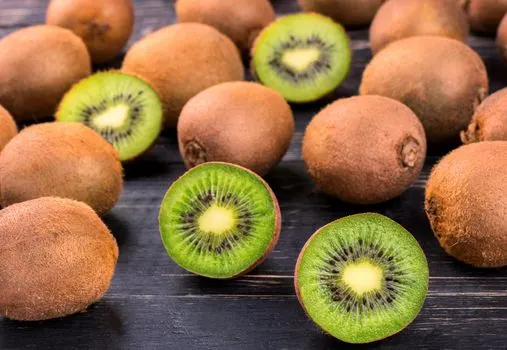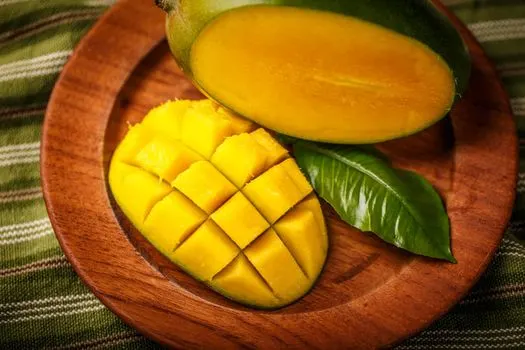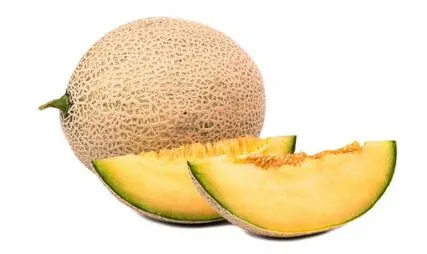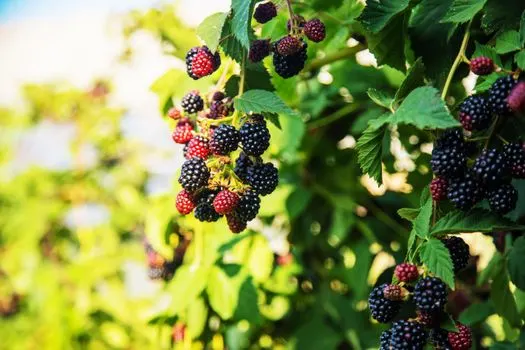Many dogs are curious and want to eat what their owners are eating. Being omnivores and having a natural diet consisting of both meat and plants, fruit can be a yummy treat for a dog.
As a veterinarian, I am often asked what foods are and are not safe for dogs. The good news is that the majority of fruits are safe to share with your furry friend.
However, because there are some exceptions, it is a good idea to always check with a veterinarian before offering your dog a new fruit.
 Kiwi fruit is safe for dogs to eat. Kiwis are small, delicious, and many dogs very much enjoy the taste.
Kiwi fruit is safe for dogs to eat. Kiwis are small, delicious, and many dogs very much enjoy the taste.
If you would like to share some kiwi fruit with your dog, it is important to note that you should not feed them the skin. The kiwi fruit should also be sliced and offered in small amounts.
About Kiwi Fruit for Dogs
Kiwi fruits are small green-fleshed fruits covered with slightly hairy outer skin. Also known in gardening circles as the “Chinese gooseberry,” they are both sweet and tangy. This fruit makes a great healthy snack for humans and can also be fed safely to dogs.
Kiwi fruit can help support the digestive system, heart health, and immunity. Kiwi fruit contains high concentrations of vitamins C, K, and E, as well as folic acid and potassium.
The skin is high in soluble fiber, which can promote healthy digestion. Kiwi fruit is also low in calories, making them a healthy snack.
Additionally, kiwi fruit contains high levels of antioxidants such as choline, lutein, and zeaxanthin. These compounds work to remove free radicals from the body.
Free radicals are unstable molecules that the body produces during metabolism and other processes.
So, Can Dogs Really Eat Kiwi Fruit?
 Dog can safely eat kiwi fruit. However, to make this a safe snack for a dog, there are a few things to keep in mind. When feeding the fruit to your canine companion, always remember to remove the skin and also to cut the fruit into pieces.
Dog can safely eat kiwi fruit. However, to make this a safe snack for a dog, there are a few things to keep in mind. When feeding the fruit to your canine companion, always remember to remove the skin and also to cut the fruit into pieces.
As I suggest with any new addition to your dog’s diet, it is essential to introduce kiwi fruit slowly and in small amounts. Though rare, it is possible for a dog to have an allergy to the fruit.
Other dogs may simply have sensitive digestive tracts that cannot handle fruit.
As stated above, kiwi fruits are very healthy as snacks for humans. However, to date, there is no research about whether or not dogs reap the same benefits from fruit.
If your dog enjoys kiwi fruit and you would like to share it with them, there is no reason not to do so. However, kiwi fruit should not be added to a dog’s diet for health benefits.
Possible Health Issues When Feeding Kiwi Fruit To Dogs
 Although the inner flesh of the kiwi fruit is safe to feed to your dog as a snack, there are a few things to consider first. I recommend peeling the kiwi fruit before giving the fruit to your dog.
Although the inner flesh of the kiwi fruit is safe to feed to your dog as a snack, there are a few things to consider first. I recommend peeling the kiwi fruit before giving the fruit to your dog.
If fed kiwi fruit with the skin, many dogs may experience gastrointestinal upset. The skin is not toxic and technically is safe if your dog got into kiwi fruit without your knowledge.
However, the skin contains more significant amounts of fiber as well as small, hair-like projections, which both can irritate a dog’s stomach and intestines.
Additionally, because most dogs are not used to eating fruit in their diets, kiwi fruit should always be offered in moderation. Large quantities of kiwi fruit, or any fruit, can cause gastrointestinal upset in dogs.
Large amounts of fruit may also leave your dog not hungry for their regular diet, which can lead to nutritional deficiencies over time.
Signs that your dog has eaten too much kiwi fruit or is sensitive to the fruit are:
- vomiting
- diarrhea
- stomach pain
- inappetence
- lethargy
- excessive drinking
Another potential danger with kiwi fruit and dogs is the possibility of choking if the fruit is fed whole.
These small, egg-shaped fruits are the perfect size to become lodged in a larger dog’s throat if swallowed as one piece. Always remove the skin and feed the flesh of the fruit cut up into small pieces.
How To Select The Right Kiwi Fruit For Your Dog
 Luckily, kiwi fruit is an easy-to-find fruit that is available all year round. When choosing a kiwi fruit for your dog (and for yourself), make sure to select a ripe fruit.
Luckily, kiwi fruit is an easy-to-find fruit that is available all year round. When choosing a kiwi fruit for your dog (and for yourself), make sure to select a ripe fruit.
Ripe kiwi fruit will be firm but not hard. A hard kiwi is not yet ripe, and squishy kiwi fruit is overripe. The kiwi fruit’s skin should be smooth, slightly hairy, and free of bruises, spots, mold, or wrinkling.
Feeding under or over-ripened kiwi fruit to your dog may increase the likelihood of them having gastrointestinal upset.
How To Give Kiwi Fruit To Your Dog
After you have found the perfect, ripe kiwi fruit, you should thoroughly wash the outside of the fruit before offering it to your dog.
If you will not be eating the skin (or feeding it to your dog), peel the fruit and then cut it into small slices. These bites should be tailored to the size of the dog you are offering the fruit to.
Start slow, and only offer your dog a few small bites of kiwi fruit to start. Dogs are individuals, and some may love kiwi fruit, while others may not like it at all.
If you find that your dog both enjoys and can tolerate kiwi fruit, you can start adding the fruit into their daily diet (in small amounts) or put the fruit into a puzzle toy.
These toys can help to encourage healthy activity as well as provide mental stimulation for your dog.
If you have a little more time and want to make an even more fun treat for your pet, kiwi fruit can be frozen to add a crunch or blended with other safe fruits and vegetables to make a healthy frozen pup-sicle!
Alternatives To Kiwi For Dogs
 Dogs can eat kiwi fruit as a snack or treat. But there are many other healthy alternatives too!
Dogs can eat kiwi fruit as a snack or treat. But there are many other healthy alternatives too!
As stated above, strawberries, melon, blackberries, and mango can all be fed to dogs as treats. Pumpkin (canned) can also be added to a dog’s diet to help ease constipation.
If you are wanting to try other healthy snacks for your pet, you can also offer some veggies! Carrots, cooked potato or sweet potato, spinach, and green beans are all safe.
As always, start slowly by offering small amounts of the fruit or vegetable. Even though these treats are healthy, you do not want your dog to fill up with these and then not eat an adequate amount of their regular dog food.
Fruits and vegetables are high in fiber. This fiber can be a great aid to a sluggish gastrointestinal tract, but some dogs are very sensitive to fiber. If any stomach pain, vomiting, or diarrhea is seen, discontinue feeding the fruit or vegetable to the dog.
Make sure to avoid onions, garlic, raisins, and any dish that may contain these as they are toxic to dogs and can cause severe illness.
Final Thoughts On Kiwi Fruit And Dogs
As is the case with many fruits, dogs can safely be fed kiwi fruit, and many dogs enjoy it. To make the kiwi fruit a safe snack for your pet, I recommend removing the skin and cutting the fruit into small pieces.
This will ensure the fruit is not a choking hazard and reduce the chance that your dog will experience gastrointestinal upset.
Other Frequently Asked Questions About Kiwi Fruit And Dogs
Can dogs eat strawberries?
 Dogs can eat strawberries. Strawberries contain high levels of fiber and vitamin C. Also, strawberries contain the enzyme malic acid, which may aid in whitening a dog’s teeth.
Dogs can eat strawberries. Strawberries contain high levels of fiber and vitamin C. Also, strawberries contain the enzyme malic acid, which may aid in whitening a dog’s teeth.
As with all fruits, they should be offered to dogs in moderation and cut into pieces. Strawberries can pose a choking risk if fed to dogs whole. Diabetic dogs should not be fed strawberries as they are high in natural sugars.
Can dogs eat mango?
 Mango can be a safe and healthy treat for dogs. The mango is full of vitamins and soluble fiber. It is important to remove both the pit and the skin if your dog has a history of a sensitive stomach.
Mango can be a safe and healthy treat for dogs. The mango is full of vitamins and soluble fiber. It is important to remove both the pit and the skin if your dog has a history of a sensitive stomach.
As with all fruits, mango should only be fed to dogs in small amounts.
Can dogs eat cantaloupe and melon?
 Cantaloupe and melon are both safe for dogs to eat in moderation. The rind should always be removed before feeding cantaloupe or melon to your dog.
Cantaloupe and melon are both safe for dogs to eat in moderation. The rind should always be removed before feeding cantaloupe or melon to your dog.
The seeds of these fruits are not toxic to dogs but ideally should be removed before feeding to decrease the likelihood of stomach or intestinal issues. Cantaloupe and melon can both be frozen to make a crunchy, cool treat.
Can dogs eat blackberries?
 Dogs can eat blackberries as a treat. These little fruits can be a great easy snack for your pup, full of vitamins and low in calories. Blackberries should be avoided or cut into smaller pieces for small dogs to reduce the risk of choking.
Dogs can eat blackberries as a treat. These little fruits can be a great easy snack for your pup, full of vitamins and low in calories. Blackberries should be avoided or cut into smaller pieces for small dogs to reduce the risk of choking.
Also, if your dog has a sensitive stomach or doesn’t handle fiber well, the multitude of tiny seeds contained within blackberries may cause unpleasant issues.
Dr. Jamie Whittenburg is a vet with 15 years of clinical experience. She graduated from Kansas State University College of Veterinary Medicine in 2006. Her area of expertise is small animal general practice, equine practice, surgery, and academia.
Dr. Whittenburg operates her own hospital in Lubbock, TX, named Kingsgate Animal Hospital. Medically, she’s most interested in practicing general surgery and feline medicine. When not at work, Dr. Whittenburg enjoys outdoor activities, reading, and spending time with her family.



Leave a comment
You must be logged in to post a comment.